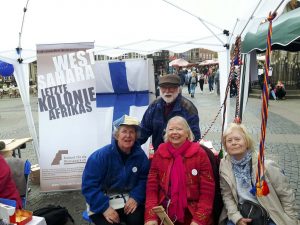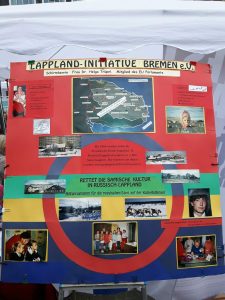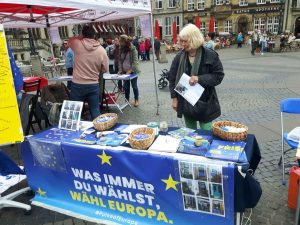So, once again we have celebrated the First of May – the special day of working people and international workers’ movement. Usually I do not feel inclined to engage myself (as an expatriate) in the politics of my host country (Germany). But to me the First of May demonstrations are clearly that kind of citizens’ participation in which I can join whatever my citizenship status may be. (To be sure – as an EU-Citizen I have no reason to complain: I have voting rights in the local/regional elections in Bremen and I can choose whether to vote for Finnish or German candidates in the elections of the EU-parliament.) In a similar way I have found my way way to the “Pulse of Europe” movement and its weekly demonstrations on Sundays.
Now that the First of May happened to be on Monday, I have been in two demonstrations on the successive days. Below I give short reports of both events. I will start with the First of May and the go back to the Pulse of Europe movement and its events in Bremen.
First of May in Bremen: The usual story – but with something new to think about
During my years in Bremen I have participated several times in the First of May demonstrations. Sometimes (in particular before the elections) there has been more interest to participate, sometimes less. This time – as I remember it – we were fewer than couple of times before. But we were enough to pass the message that this is a living tradition. Yet, when looking at the groups involved – they were pretty much the same: The major trade unions formed the majority. The political parties of the left (SPD, die Linke and the smaller groupings) were also there – of course. And we had the left groupings of several ethnic minorities – in particular the Kurdish people were actively present pleading for solidarity to their cousins in Turkey, Syria and Iraq. The German trade unions drew attention to the need to improve the resources in education and the care of elderly people – petitions were presented and signed. This was the familiar side of the event.
What was new then? Firstly, during the procession I got into conversation with a representative of teachers and researchers (GEW), who informed me of their local initiative group for international solidarity and cooperation. I became aware of their cooperation with similar trade unions in Turkey, Palestine and Burkina Faso – with initiatives that cover school education as well as higher education. I was invited to have a closer look at their activities and I will try to follow this up. Also, during the procession I got a leaflet of a solidarity initiative to support the refugees stuck on the isle of Lesbos (Lesvos). There was no chance to start a conversation but I will try to get a more detailed picture on the situation and on the work of the support initiatives. Here are the links to the websites:
http://www.lesvossolidarity.org and www.bremenlesvos.wordpress.com.
Pulse of Europe in Bremen: The new movement with a clear message
In February and March I became aware of a new pro-European movement that had started weekly demonstrations for a positive thinking about Europe. Clearly, this was thought as a counter-model to the Dresden-based “PEGIDA” – a xenophobic and islamophobic movement that has provided a basis for right-wing populism and radicalism. And clearly, the Brexit-referendum in the UK and the presidential election in the USA in 2015 were the wake-up calls. The founders – individual citizens in Frankfurt – came to the conclusion that we need a popular movement that raises awareness of positive values, ideas, achievements and citizens’ participation opportunities related to the European Union. The initiative has to keep itself independent and open to all who are interested in taking action for Europe. And furthermore – the movement itself calls for active voting and contacting voters and politicians. It all started in a local demonstration in Frankfurt and the movement has spread all over Germany and to several other countries.
The demonstrations follow the same pattern: The ‘Pulse of Europe’ initiative is presented as an open and independent citizens’ initiative. The 10 points manifesto is presented. There may be a guest presentation. Then there is a review on key events or incidents at European level. The audience is then invited to sing the Pulse of Europe version of the “Ode for Joy”. Then there mey be a ‘Greetings to …’ action with postcards or with posters and group photos. Then comes the “Open microphone” session for participants to present their views, arguments, messages or critique to be taken on board. And finally, there is the cultural concluding part when the participants join in a chain of people round the square to dance or to listen to a music performance. We have been dancing Sirtaki (focus on Greece) and listened to a bagpipe player (focus on the UK) and so on (I have missed couple of events when travelling).
To me this new movement has been a most welcome fresh wind. I have been happy to see, how the organisers and participants take this mode of participation seriously. Everyone knows that such a popular movement that tries to keep itself open for people with different political opinions cannot go into great detail. Yet, the ten points and the issues brought into discussion provide a good balance between positive ideas and critique of the aspects in present-date EU that tend to alienate citizens and decision-makers from each other. One of the key points of the movement is that we have reform EU to make it sustainable – but we have to keep it first to be able to reform it. And this is the message that the movement has been passing to other nations who have had or will have elections – in particular the Netherlands and France. The current message to our French neighbours is: “Restons ensemble!” (Let us stay together!) Or – as I would continue it: “Marchons ensemble!” (Let us proceed together!)
Here the links to the website of #Pulseofeurope and to the facebook-group:
http://pulseofeurope.eu (in German)
http://pulseofeurope.eu/pulse-of-europe-what-is-at-stake/?lang=en (in English)
https://www.facebook.com/PulseofEurope/
Next Sunday we will meet again at the central square of Bremen (Marktplatz) at the City Hall (Rathaus). We will continue.
More blogs to come …




